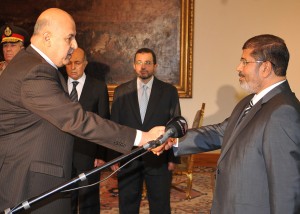Egypt’s Prime Minister Mostafa Madbouly led a high-level ministerial delegation at the Egyptian-Iraqi Joint Higher Committee meeting in Baghdad, on Saturday, during which he affirmed Egypt’s keenness on boosting its relations with Iraq.
The meeting was jointly headed by Madbouly and his Iraqi counterpart Mustafa Al-Kadhimi.
“There are clear mandates from President Abdel Fattah Al-Sisi that all Egyptian expertise in various fields be available for [our] Iraqi brothers,” Madbouly said during his speech before the committee.
The meeting was concluded with a principle consensus on the importance of establishing the oil-for-reconstruction mechanism. This will take palce through Egyptian companies implementing development projects in Iraq, in return for quantities of oil that Egypt would import from Iraq.
Madbouly expressed Egypt’s readiness to increase cooperation in the electrical interconnection project with Iraq, in coordination with Jordan.
The Egyptian delegation included the following Ministers: of Electricity and Renewable Energy Mohamed Shaker; of Petroleum and Mineral Resources Tarek El Molla; of Manpower Mohamed Saafan; of International Cooperation Rania Al-Mashat; of Health and Population Hala Zayed; of Housing, Utilities and Urban Communities Assem Al Gazzar; of Transportation Kamel El-Wazir; of Civil Aviation Mohamed Manar Ennaba; and Trade and Industry Nevine Gamea. Also in attendance at the meeting was Mohamed Abd El-Wahab, Executive Director of the General Authority for Investment and Free Zones (GAFI).
Madbouly noted that the meeting comes at a critical time, in which the entire region is witnessing successive developments. These require cooperation and strategic partnership between Egypt and Iraq to face these common challenges.
He further said that the fundamentals of the Egyptian policy towards Iraq, which is based on the importance of preserving the country’s unity and sovereignty, and to reject all forms of foreign interference in its affairs. Madbouly hailed Iraq’s successful efforts in defeating terrorism.
Egypt also rejects illegal attacks within Iraqi borders, whilst also understanding the country’s political, historical and geographical particularities. This particularly qualifies Baghdad as an arena for a meeting of interests, in Egypt’s view, rather than as for a conflict of interests, or for regional and international competition.
Moreover, the Prime Minister indicated that the Egyptian-Iraqi Joint Higher Committee’s meetings aim to maximise the mutual benefit from the experiences and capabilities of the two countries. They will also aim to achieve the maximum possible benefit from their cooperation in various fields.
He showcased some of the successes that Egypt was able to achieve during the past six years, such as converting the severe deficit in electric energy into a large surplus. Egypt has also successfully constructed the needed infrastructure that was for targeted investment, completing the national road network, and the New Suez Canal.

